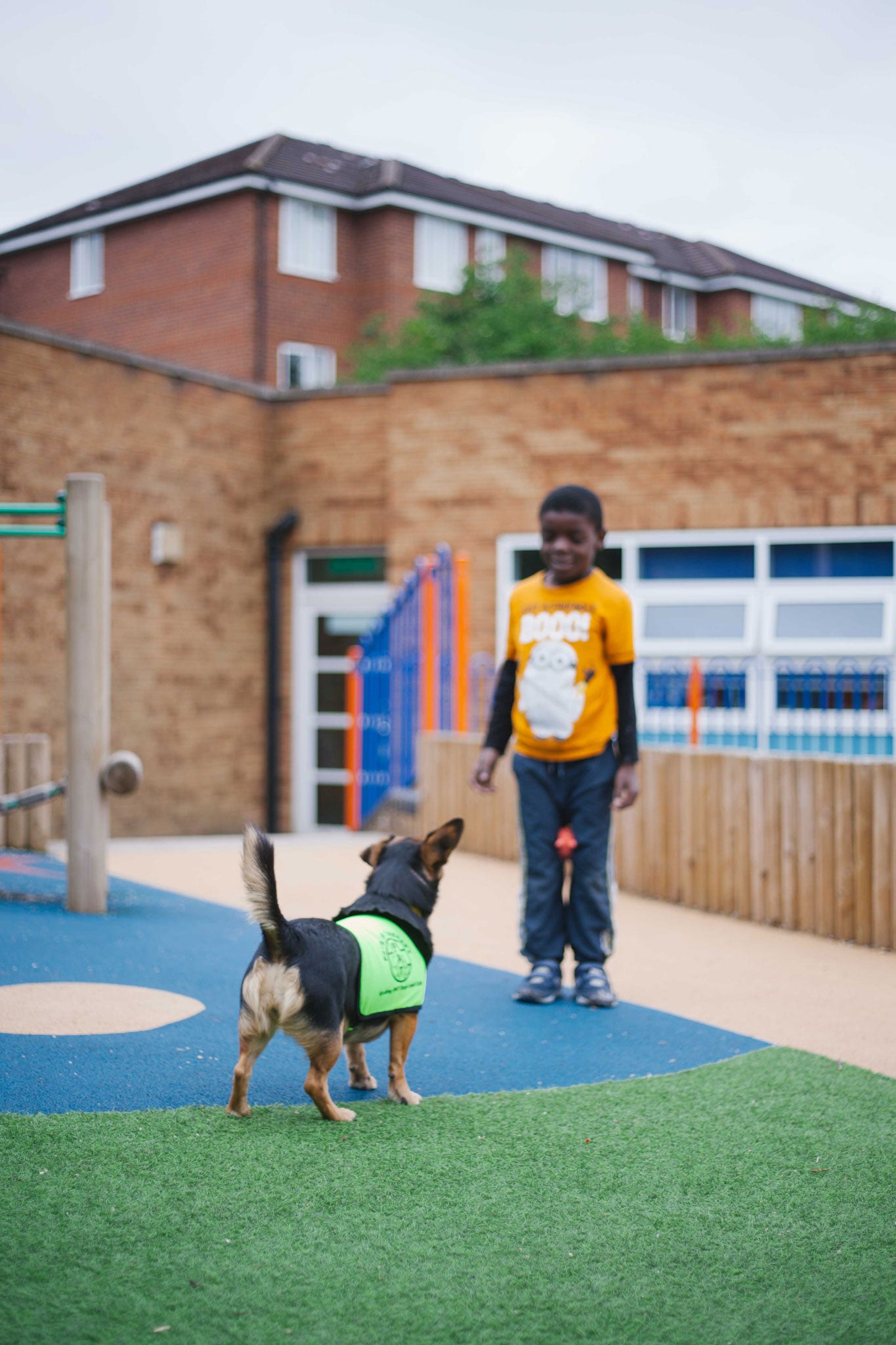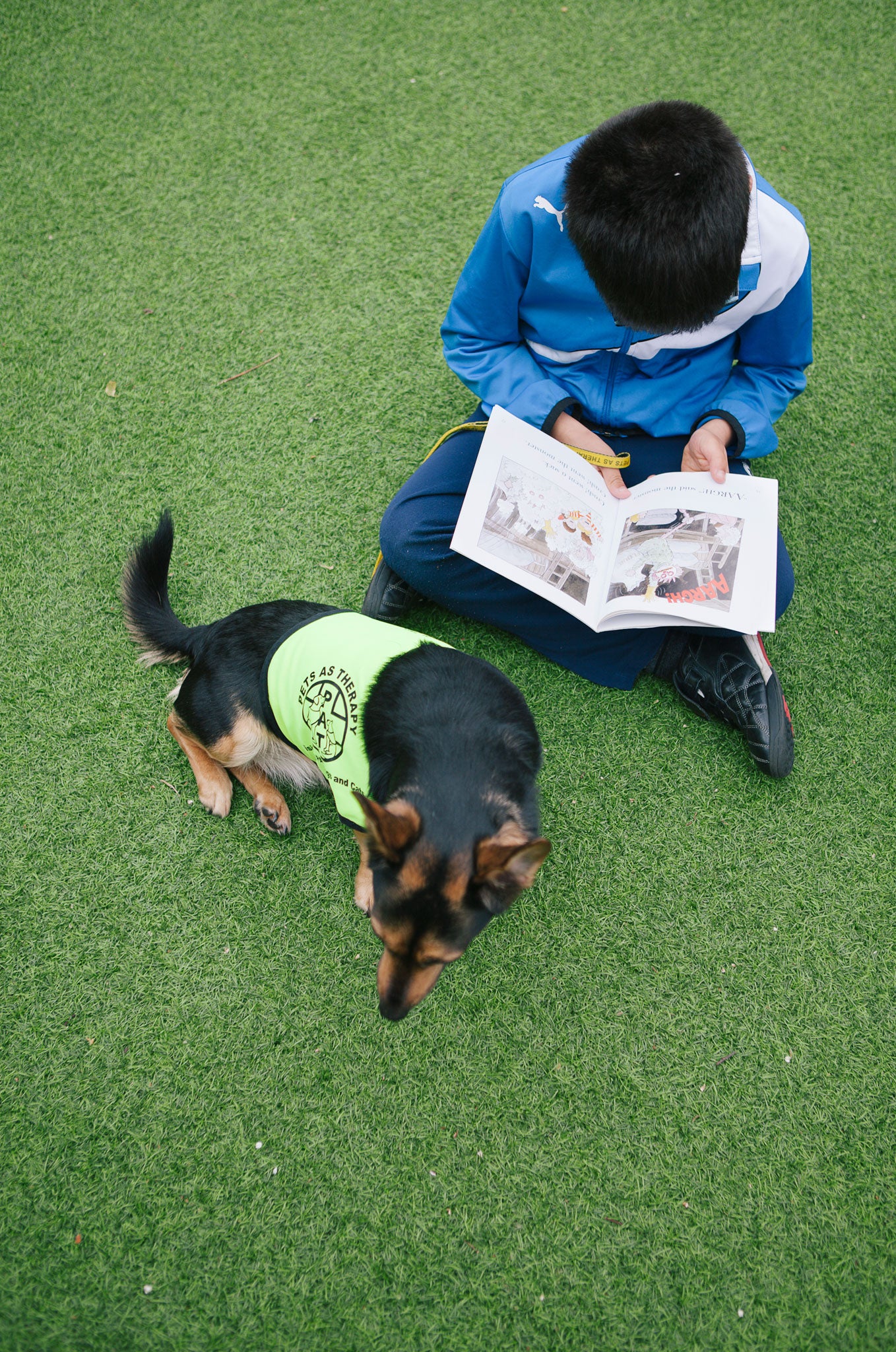Pets as Therapy: How Millie the Jack Russell is helping children learn to read
Befriending a dog can be life-changing - never more so than for children who find school a challenge

Every Friday lunchtime, Denise Kantor and Millie, her Jack Russell, leave their home in Willesden Green in north-west London and make the short journey by foot to Anson Primary School. A single-storey building hidden from the street by a bank of trees, Anson has been described by Ofsted as "a village school in the United Nations of Brent".
The school is fairly typical of Brent in that 66 per cent of its pupils have English as a second language, compared with 19 per cent nationally. Other features of the borough's schools include high levels of child poverty, and of behavioural and educational difficulties. It's against this background that Millie – one of 5,000 cats and dogs that the charity Pets as Therapy ferries across the country to provide comfort and aid learning in schools, hospices and nursing homes – makes her weekly visit to Anson.
"We weren't really quite sure how we were going to sell this to teachers and the management," says Adrian Clargo, a teaching assistant at the school who oversees the programme. "Because you think, 'how is that possibly going to help?'"
On a typical visit to Anson, Millie will spend 15 minutes each with three or four different children. They might have learning difficulties, or be struggling with English. Depending on their needs, she will be walked, petted, or read to – and, occasionally, manhandled. For a child with learning difficulties, time spent with Millie will engage a range of faculties – without feeling like a chore.
The therapeutic value of canines has been long recognised. Sigmund Freud would use his chow Jofi to put patients at ease, especially when the patients were children. Florence Nightingale extolled the virtues of animals in helping to bring comfort to the infirm.
Seven-year-old Ali is Millie's first master of the day. He is smiley but shy, avoiding eye contact. He looks at me side-on. But he's excited to see Millie, quickly clipping on her lead and taking her for a lap of the playground. "In terms of using fine motor skills and being able to thread the lead, that's often an activity that we would take children out of class for 20 minutes to achieve," says Mr Clargo.
Now the dog's role changes. With Millie at his side, Ali picks up a book and begins to flick through the pages, answering questions from Denise and his teacher. "How many dogs are there on the page?" "Do you think Millie likes the book?" Some speculate that as humans evolved alongside animals, the sight of a relaxed pet signals to our inner Neanderthal that it is safe to drop our guard. Millie's role is similar to that of a sock puppet – a third point of reference on which teacher and child can focus, diffusing any head-on tension.
A boy called Junior shoots into the playground and runs straight up to me and Mr Clargo. He gets hold of Millie's lead and he's off, the dog barely able to keep up. After posing for his picture, Junior mounts a small wooden stage and says he wants to tell a joke. "Why did the chicken cross the road?" Pause. "Because he wanted to!" He looks at us blankly. Junior, says Mr Clargo, is one of the programme's big success stories. He used to be extremely shy but has blossomed since Millie came along. "It's not just the working with Millie," Mr Clargo says, "but being made to feel special. A lot of the children come from large families and this builds their self-esteem. That affects everything they do."

The third pupil we meet is a boy called Jaylen. At first, he is withdrawn. As he leads Millie around the playground, odd socks – one red, one black – flash from under his trousers, and the big toe on his left foot bulges through the seam of his scuffed, Velcro-strapped trainer. When he's completed his lap, I ask him if Millie is his friend. He whispers back that she is.
We take Millie into Jaylen's classroom, to the delight of his classmates. They are sitting in a circle on a mat. Standing in its centre, with all eyes on him, Jaylen clutches Millie's lead. Some of the children shriek and back away. Others lean in to stroke her. "If you, if you, if you," Jaylen stutters excitedly, "bring your ball and shake it and throw it" – he demonstrates a wide underarm arc – "she brings it back!"
At 3 o'clock, Millie's work is done. Her Pets as Therapy jacket comes off, and she goes back to being a regular mutt.
Join our commenting forum
Join thought-provoking conversations, follow other Independent readers and see their replies
Comments
Bookmark popover
Removed from bookmarks